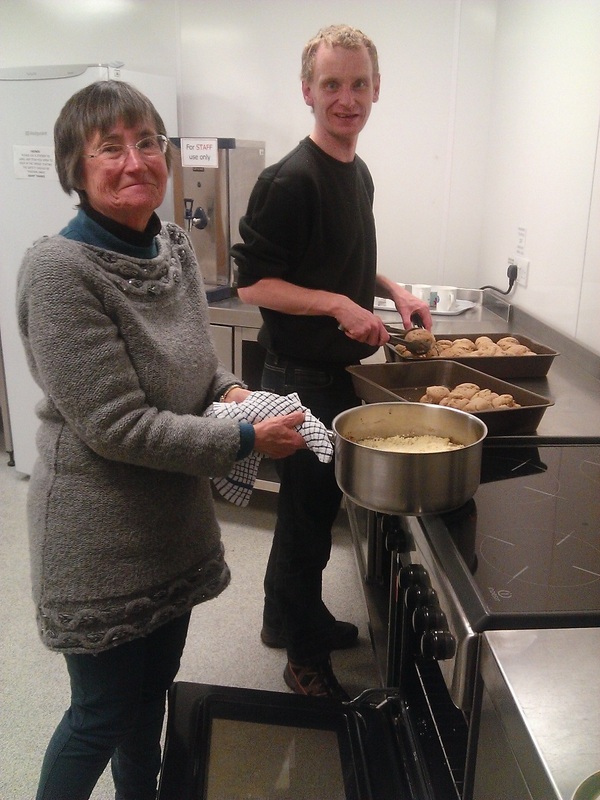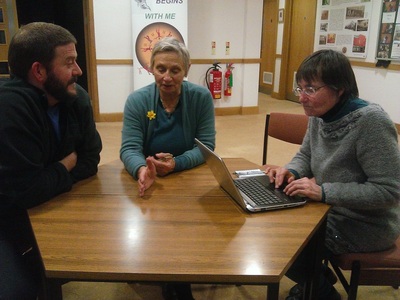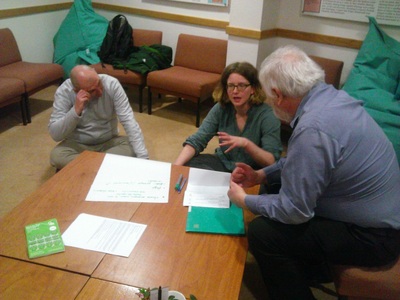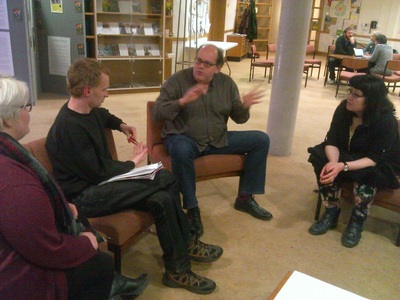After home made bread, soup and fruit crumble, and the buzz of conversation, Sally and Steve facilitated the little stories event, encouraging group members to introduce each other, and contributing one word from each person to describe their day.
The Little Stories Project – 3 pillars
1. Little Stories show us how a more creative, compassionate and life-sustaining world is possible, and how ordinary people are already making this happen.
2. Little Stories are true, although the true identity of the characters is not always known. Sometimes people tell their own story, in the first person.
3. Little Stories are no more than 360 words. They could also be in a form other than text, such as a YouTube or Vimeo clip.
The Stories
To give us an idea of the project and the stories we were read some.
First Steve read one about Gina.
Gina gave up her busy London life to move to a remote area of Scotland. She restored a building for neighbours and adopted permaculture into her life. She shared her home with local wild life. (read the Little Story here)
Sally followed with the Citycombers story
Liverpool venture where volunteers worked every day and when the money ran out, they volunteered, learning to grow food and scavenging things to recycle to further the growing project. They provided flowers to support the local bee population. (read the Little Story here)
Then we heard the story about Mike the Gasfitter, who supported one of his customers to get help to stop using drugs. (read the Little Story here)
Alison was having a horrible day and in the middle of moving house when she wrote this story in her lunch break
She is moving into a new house in a housing co-op. For the first time she had a share in a garden. The excitement of learning to mow a lawn and grow food. (read the Little Story here)
Another beautiful story we were read was Clothes. A story about kindness and community. (read the Little Story here)
A Thought
What difference do small acts of kindness make? We make a small change in our lives and maybe encourage others to do the same. The hope of little stories is to change the predominant culture to give people a lift. Stories can tell us who we are and how we are changing.
A Tip
- Tell the truth but tell it slant. Don’t preach.
Group Response
We then moved into some discussion about how we could start to think about using stories in our lives.
Among the group, there were people who were just starting to blog and felt inspired to use stories in this way as it was a little less intimidating than writing a full blog post. Another person shared how recognising that the story of his life has been cyclical and that now it is becoming clear that living life in a more sustainable way feels so exciting, growing food, moving stories on from past habits to planning stories of change for himself and what he can do in the future.
In Transition, stories are a means of change, looking into the future and then producing a time line that includes steps needed between where we are now and what we do to get to our preferred future.
Using stories therapeutically is a powerful way to jump into the present and tell stories without the fear of censorship from others.
Stories of success can help us change the future and help us value the marginal.
Bringing about change can be supportive.
Other Projects
We heard about Tipping Point, a project that tells the story of how we can face climate change, bringing science and the arts together. Being unafraid of the future, and having a vision of where we want to be.
Whose stories?
We shared ideas about where and who to source stories from, and how to engage with people. Suggestions were shared about gathering stories from prisoners, children, the elderly (reminiscence), bringing different life experiences into focus.
What format could the stories be in?
We talked about the idea of the stories being read aloud and possibly recorded in audio for the little stories website. Perhaps creating a podcast to download and listen to on electronic devices. They could perhaps also be illustrated.
How can they be used and who with?
They can be used to build on the rich tradition of folk stories which were used to tell the story of the journey of our life. People used to know the stories and myths. We could create modern stories drawing on the tradition.
What next?
You can find out more about the Little Stories project here or by contacting Steve and Sally on little_stories@yahoo.co.uk
We will not have an event in April. The next event will be an open market
May 13th Really Really Free Market. How can we develop opportunities for swapping and recycling or upcycling our unwanted goods? You’re invited to bring your own unwanted items and help yourself to other peoples’ unwanted stuff. We’ll also welcome ideas on recycling and upcycling and would love to find out what people might already be doing.
We meet the second Wednesday of each month at Quaker Meeting House on School Lane L1 from 6.30pm.





Recent Comments